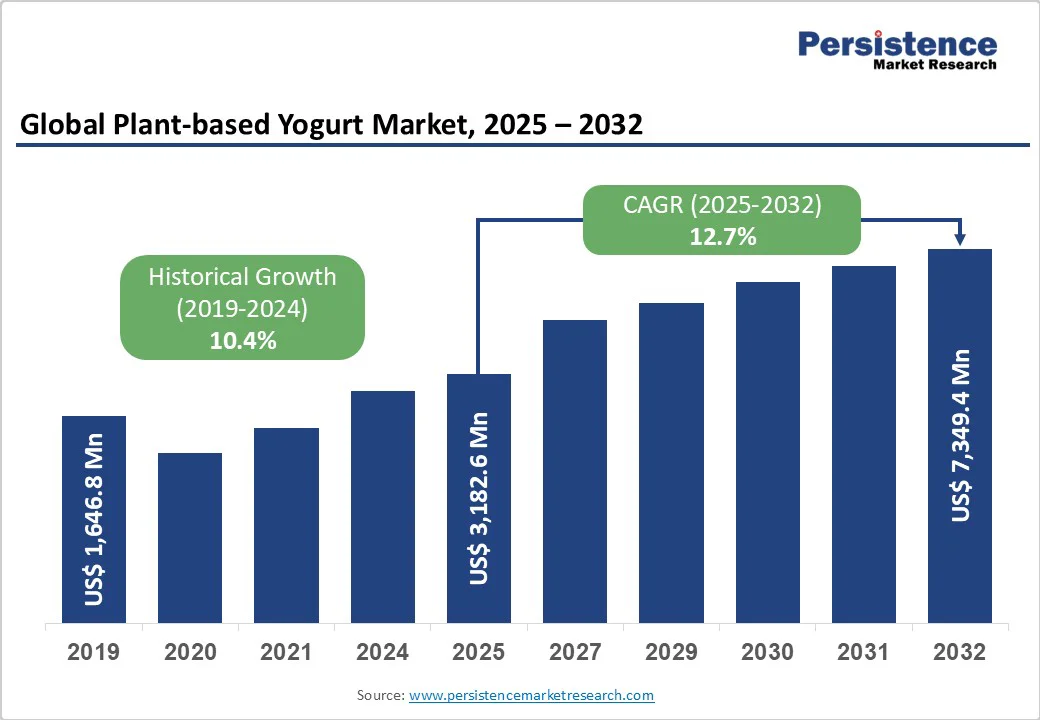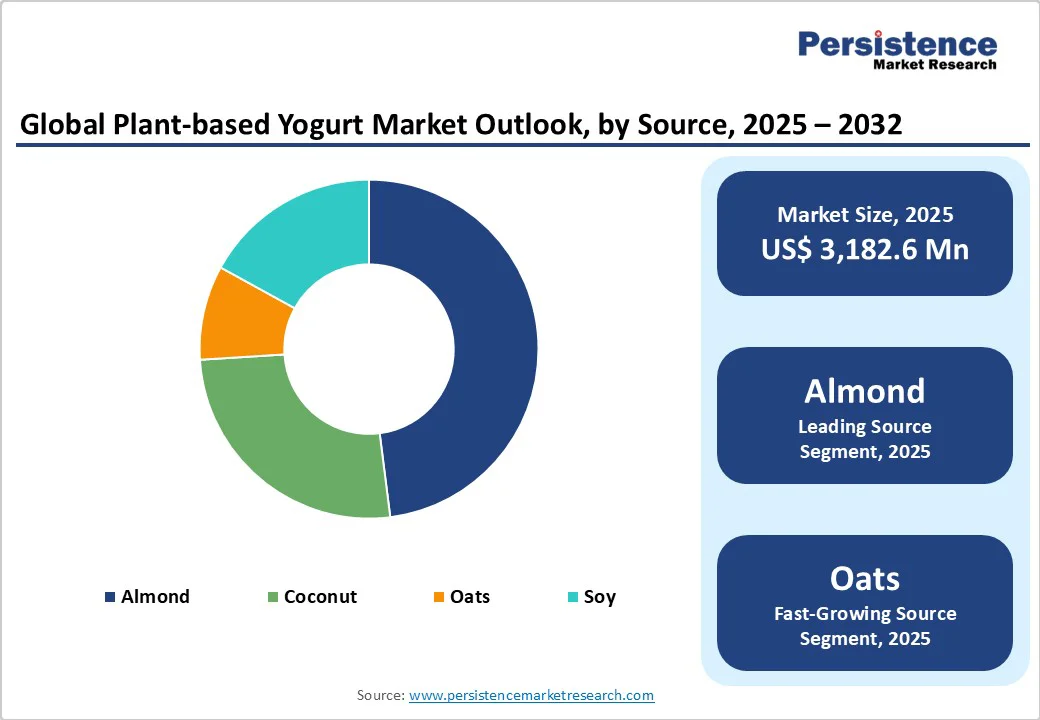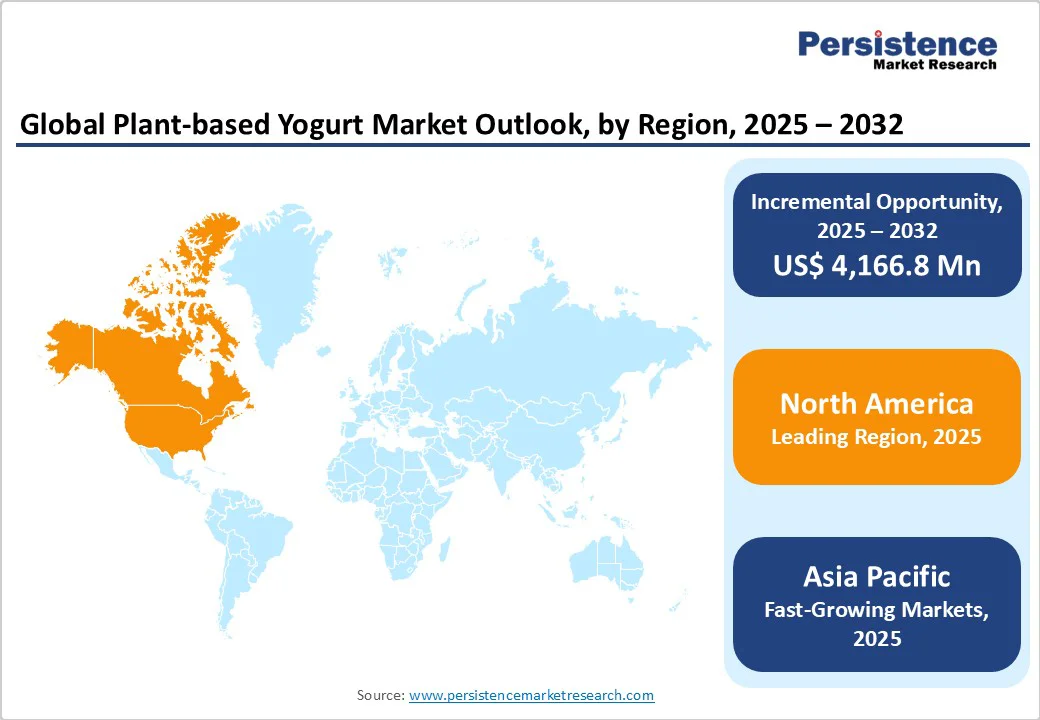ID: PMRREP34007| 197 Pages | 8 Oct 2025 | Format: PDF, Excel, PPT* | Food and Beverages

The global plant-based yogurt market size is likely to increase from US$3,182.6 million in 2025 to US$7,349.4 million by 2032, growing at a CAGR of 12.7% during the forecast period from 2025 to 2032.
| Key Insights | Details |
|---|---|
|
Plant-based Yogurt Market Size (2025E) |
US$ 3,182.6 Mn |
|
Market Value Forecast (2032F) |
US$ 7,349.4 Mn |
|
Projected Growth (CAGR 2025 to 2032) |
10.4% |
|
Historical Market Growth (CAGR 2019 to 2024) |
12.7% |

Lactose intolerance affects approximately 68% of the global population, according to the U.S. Department of Health and Human Services. This widespread condition leads many individuals to seek dairy-free alternatives to avoid digestive discomfort. Additionally, the increasing prevalence of dairy allergies, especially among children, further drives the demand for plant-based yogurt options. These alternatives, derived from sources such as soy, almonds, and coconuts, provide a safe and nutritious option for individuals with lactose intolerance or dairy allergies.
The growing awareness of these health concerns has led to a surge in the availability and variety of plant-based yogurt products in the market, catering to the dietary needs of a diverse consumer base. As a result, plant-based yogurts are becoming a staple in many households, reflecting a significant shift towards inclusive and health-conscious eating habits.
Fluctuations in agricultural harvests create an overlooked yet promising opportunity for players in the global plant-based yogurt market. Variability in crops such as soy, oats, almonds, and coconuts often leads to differences in taste, texture, and nutrient composition between batches, challenging manufacturers to maintain uniform quality. Addressing this issue through advanced processing technologies, ingredient blending, and precision fermentation allows producers to standardize flavors and improve consistency.
By investing in crop traceability, controlled sourcing, and bioactive fortification, brands can enhance consumer trust while turning a potential weakness into a strength. Highlighting transparency in supply chains and offering assurances of batch-to-batch stability positions companies as reliable partners in a crowded marketplace. This pursuit of consistency not only elevates consumer satisfaction but also opens pathways for premium offerings in the plant-based yogurt category.
A wave of innovation is redefining the global plant-based yogurt market, with fortified formulations targeting personalized nutrition emerging as a key growth opportunity. By incorporating novel bioactive proteins, such as those derived from peas, fava beans, and fermented rice, manufacturers can create products tailored to specific health needs, including muscle support, digestive wellness, and immune enhancement. These fortified yogurts appeal to health-conscious consumers seeking functional foods that align with individualized dietary goals, including athletes, seniors, and flexitarians.
Companies such as Danone are already exploring protein-enriched plant yogurts to meet evolving consumer demands. Advancements in protein processing and encapsulation technologies enable improved taste, texture, and bioavailability, thereby overcoming traditional challenges in plant-based formulation. By leveraging these innovations, plant-based yogurt producers can differentiate their offerings, enhance nutritional value, and capture premium segments, positioning themselves as leaders in the growing personalized nutrition trend within the dairy-alternative beverage sector.
Almonds hold 46% market value share as of 2025, making them the leading source in the global plant-based yogurt market. Their mild flavor, creamy texture, and versatility allow manufacturers to create products that appeal to a broad range of consumers, from flexitarians to fully vegan audiences. Almond-based yogurts are rich in vitamin E, healthy fats, and plant protein, aligning with growing health-conscious and clean-label trends. Leading brands like Alpro, Silk, and Califia Farms have expanded almond yogurt portfolios, offering Greek-style, flavored, and fortified variants to meet diverse dietary preferences. The robust supply chain for almonds, particularly from the U.S. and Spain, ensures consistent availability and quality for manufacturers. Almond yogurts are increasingly incorporated into smoothies, desserts, and ready-to-eat meals, reinforcing their dominance and making them a strategic focus for companies aiming to capture value in the expanding plant-based yogurt sector.
Flavored plant-based yogurt is expected to grow ata 14.3% CAGR during the forecast period 2025–2032, reflecting consumers’ increasing appetite for taste variety alongside health-conscious choices. Fruit-infused options such as strawberry, blueberry, and mango are gaining popularity, while exotic flavors like matcha, acai, and turmeric are capturing niche interest among adventurous and wellness-oriented consumers. The trend is particularly pronounced among Millennials and Gen Z, who seek enjoyable, on-the-go snacking experiences that do not compromise their plant-based or clean-label commitments.
Food manufacturers are responding by experimenting with natural sweeteners, probiotics, and functional inclusions to enhance both flavor and nutritional benefits. Retailers and online platforms are expanding their offerings of flavored plant-based yogurts, making them more accessible across mainstream and specialty channels. This flavor-driven innovation enables producers to differentiate their products, stimulate repeat purchases, and foster brand loyalty in the rapidly expanding plant-based dairy alternative market.

Europe Plant-based Yogurt Market holds a significant market share of 39% as of 2024, driven by growing health awareness, environmental concerns, and widespread adoption of flexitarian and vegan diets. Consumers across Germany, the UK and France are increasingly seeking plant-based alternatives for digestive comfort, reduced lactose intake, and sustainable protein consumption. Latest trends include fortified yogurts with added protein, probiotics, and vitamins, as well as innovative flavors such as berry blends, matcha, and turmeric-infused varieties.
Clean-label formulations using oats, soy, almond, and pea proteins are gaining prominence, appealing to health-conscious and allergen-sensitive consumers. Retailers and online platforms are expanding their plant-based sections, enabling greater accessibility and variety. Collaborative innovations between startups and established dairy companies are accelerating product development and functional enrichment. These factors collectively position Europe as a dynamic market for plant-based yogurt, with continued growth expected through product differentiation and consumer-centric offerings.
The North American plant-based yogurt market is witnessing strong growth, fueled by increasing awareness of lactose intolerance, dairy allergies, and the environmental impact of animal farming. Consumers are actively seeking dairy-free alternatives that provide nutrition, taste, and convenience, aligning with health and ethical values. Innovative startups and brands are driving product diversification; for instance, So Delicious offers coconut-based yogurts, and Harmless Harvest produces plant-based yogurts with clean-label and organic ingredients. Trends in clean-label, organic, and fortified plant yogurts are gaining traction, as consumers prioritize transparency and functional benefits. Companies are also incorporating probiotics, vitamins, and novel plant proteins to enhance health appeal. Growing adoption of online grocery platforms and direct-to-consumer sales further expands access. These factors collectively position North America as a dynamic market for plant-based yogurt, with innovation and consumer-centric formulations driving sustained growth.

The global plant-based yogurt market is exhibiting dynamic behavior, with competition intensifying as both established brands and innovative startups seek differentiation. Flavor innovation is a key focus, with companies developing fruit-infused, exotic, and functional varieties to meet diverse consumer preferences. Heavy investment in R&D allows for improvements in texture, protein fortification, and probiotic integration, enhancing both nutrition and sensory appeal. Online retail and direct-to-consumer channels are expanding market reach, enabling smaller players to access niche audiences while established brands strengthen omnichannel presence.
The global market is projected to be valued at US$ 3,182.6 Mn in 2025.
Lactose Intolerance Prevalence and Dairy Allergy Risks is driving the global Plant-based Yogurt market.
The global market is poised to witness a CAGR of 12.7% between 2025 and 2032.
Developing plant-based yogurts fortified for personalized nutrition using novel bioactive proteins is the key market opportunity for key players.
Danone, Benecol Limited., Kite Hill, So Delicious, Lavva, Forager Project and others are some key players.
| Report Attribute | Details |
|---|---|
|
Historical Data/Actuals |
2019 - 2024 |
|
Forecast Period |
2025 - 2032 |
|
Market Analysis |
Value: US$ Mn |
|
Geographical Coverage |
|
|
Segmental Coverage |
|
|
Competitive Analysis |
|
|
Report Highlights |
|
By Source
By Flavor
By Sales Channel
By Region
Delivery Timelines
For more information on this report and its delivery timelines please get in touch with our sales team.
About Author